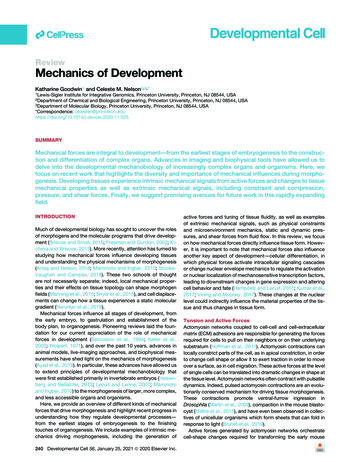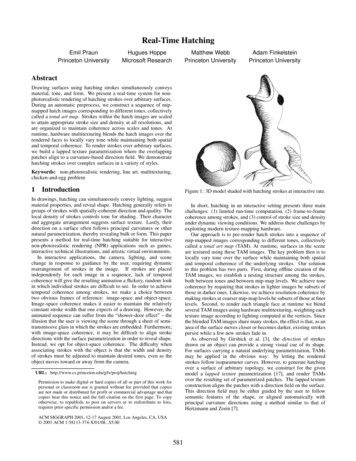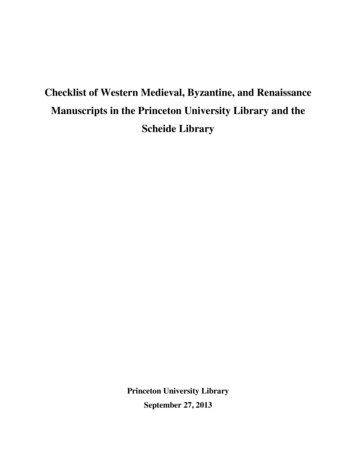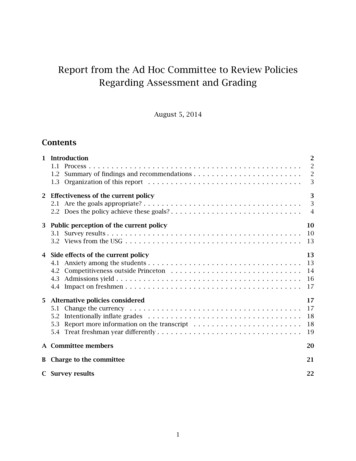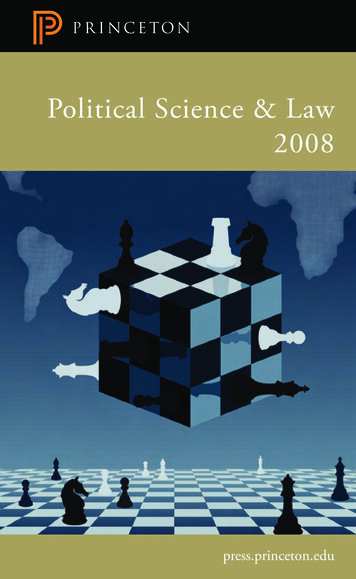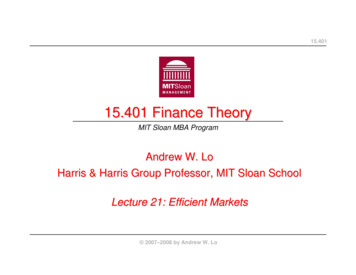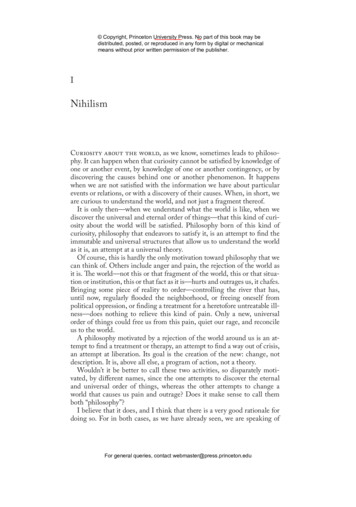
Transcription
Copyright, Princeton University Press. No part of this book may bedistributed, posted, or reproduced in any form by digital or mechanicalmeans without prior written permission of the publisher.INihilismCuriosity about the world, as we know, sometimes leads to philosophy. It can happen when that curiosity cannot be satisfied by knowledge ofone or another event, by knowledge of one or another contingency, or bydiscovering the causes behind one or another phenomenon. It happenswhen we are not satisfied with the information we have about particularevents or relations, or with a discovery of their causes. When, in short, weare curious to understand the world, and not just a fragment thereof.It is only then—when we understand what the world is like, when wediscover the universal and eternal order of things—that this kind of curiosity about the world will be satisfied. Philosophy born of this kind ofcuriosity, philosophy that endeavors to satisfy it, is an attempt to find theimmutable and universal structures that allow us to understand the worldas it is, an attempt at a universal theory.Of course, this is hardly the only motivation toward philosophy that wecan think of. Others include anger and pain, the rejection of the world asit is. The world—not this or that fragment of the world, this or that situation or institution, this or that fact as it is—hurts and outrages us, it chafes.Bringing some piece of reality to order—controlling the river that has,until now, regularly flooded the neighborhood, or freeing oneself frompolitical oppression, or finding a treatment for a heretofore untreatable illness—does nothing to relieve this kind of pain. Only a new, universalorder of things could free us from this pain, quiet our rage, and reconcileus to the world.A philosophy motivated by a rejection of the world around us is an attempt to find a treatment or therapy, an attempt to find a way out of crisis,an attempt at liberation. Its goal is the creation of the new: change, notdescription. It is, above all else, a program of action, not a theory.Wouldn’t it be better to call these two activities, so disparately motivated, by different names, since the one attempts to discover the eternaland universal order of things, whereas the other attempts to change aworld that causes us pain and outrage? Does it make sense to call themboth “philosophy”?I believe that it does, and I think that there is a very good rationale fordoing so. For in both cases, as we have already seen, we are speaking ofFor general queries, contact webmaster@press.princeton.eduMichalski.indb 110/5/2011 11:25:27 AM
Copyright, Princeton University Press. No part of this book may bedistributed, posted, or reproduced in any form by digital or mechanicalmeans without prior written permission of the publisher.2 Essay I“the whole,” of “the world,” and not of “a fragment” of the world. In philosophy as theory, we are talking about understanding “the world”; in philosophy as a program of action, about how to change it. This universalcharacter allows us, I believe, to call both kinds of activity “philosophy.”All the more so because what distinguishes one from the other is itselfdifferent from what differentiates the work of the cobbler from that of thetailor. These are not two kinds of activity dealing with different thingsand, accordingly, calling on us to separate them, at least in principle. In itsuniversality, philosophy in both senses knows no limits; it cannot tend itsown garden without peeking at the neighbor’s. To put it another way, thesedefinitions of “philosophy” do not complement one another but compete.From the perspective of philosophy as theory, “changing the world,” nomatter how much we wish it, demands a prior understanding of that world,and at the same time, from the point of view of philosophy as an outgrowth of rejection, it is the very pain that “the world” causes us that assures our knowledge of the world. And so our rejection of the world andour understanding of it are not two separate activities but one and thesame.2Nietzsche understood philosophy primarily in the second of these twomeanings. Humanity, he maintained, is sick; the world in which we live issick. The task of philosophy should be the liberation of humanity and theworld from the grips of this sickness.What is wrong with the world in which we live, according to Nietzsche?What is the basis of this pathology? And is this pathology treatable? And,if so, what should this treatment (read: philosophy) look like? The answerto both questions requires us to refer to the concept of nihilism.Nietzsche writes, “What does nihilism mean? That the highest values devaluate themselves.”1What is a value? Let’s start with the following general, formal definition: values are norms, principles, and rules that determine the order of ourlives in all arenas, the experiential order, as well as the material or physicalorder, as well as the moral order, as well as the weather. The order of theworld around us is determined by a set of rules. Following Nietzsche, wewill call these rules values, deferring for now an answer to the question ofwhy we do so.Values, Nietzsche maintains, not only establish order but are also themselves ordered. This is why we can speak of “higher” or “lower” values(those that are subordinate to the “higher” ones), and especially of thehighest values, those to which all others are subordinated.For general queries, contact webmaster@press.princeton.eduMichalski.indb 210/5/2011 11:25:27 AM
Copyright, Princeton University Press. No part of this book may bedistributed, posted, or reproduced in any form by digital or mechanicalmeans without prior written permission of the publisher.Nihilism 3What does it mean that “values devaluate themselves”? This happenswhen they no longer serve to establish order, when they no longer imposeobligations upon us, when reality slips away from them, resists them, contradicts them. We are dealing with nihilism, Nietzsche asserts in the aforementioned passage, when this happens to the highest values, that is, whenthe basic principles organizing our reality no longer organize or order ourlives.If this is the case, then what Nietzsche calls nihilism is not an outlook,or at least it is not principally an outlook. Specifically, the nihilism hespeaks of is not the view that everything is meaningless, that there’s notreally any point to anything we do, that what seems to us to be “everything” is really “nothing.” The nihilism that Nietzsche has in mind is firstof all something that happens and not something that we, correctly or incorrectly, think about reality. Nihilism is therefore an event, or a chain ofevents, a historical process—and only secondarily, if at all, an attitude,outlook, or position.Consequently, overcoming nihilism cannot depend on discovering thefalsehood or moral error of “nihilistic” attitudes or views and convincingtheir proponents of other, non-nihilistic ones. Overcoming nihilism mustmean, first of all, the modification of reality, the modification of what happens, and not of one’s outlook.3Why must we call what is happening around us “nihilism”? How is it thatthe historical process, that history itself, has assumed such a meaning?God is dead, Nietzsche tells us: that’s what happened. The death of Godis the highest—really, the only—essential “event,” and it is this that imparts meaning to all other things. What does this mean? What does itmean for God to be dead?First, let’s try to deal with what it might mean for God to be “alive.”When does God “live”? One can surely say that “God is alive” when beliefin God organizes human coexistence and determines the meaning ofhuman activities and, consequently, of the world to which those activitiesrefer. But that’s not all. Even as Christianity (for Nietzsche is primarilyconcerned with the Christian God) is losing its power—and still peoplecontinue to organize their world around some ultimate purpose (though itis no longer God but “progress,” “social justice,” or something else) whenthey seek a single, all-encompassing totality—even then, Nietzsche maintains, God “lives.”Thus when Nietzsche is talking about the “life” or “death” of God hedoes not mean the existence or nonexistence of some supernatural orFor general queries, contact webmaster@press.princeton.eduMichalski.indb 310/5/2011 11:25:27 AM
Copyright, Princeton University Press. No part of this book may bedistributed, posted, or reproduced in any form by digital or mechanicalmeans without prior written permission of the publisher.4 Essay Iotherworldly being. Accordingly, the death of God is not something thathappened to such a being and is not, in this sense, an “event.” Rather, Nietzsche is concerned with the order we strive to impose on the worldaround us, even when we no longer believe in God’s existence, even whenthe Churches have lost their social significance. “God lives” when we seekan ultimate meaning or some kind of all-encompassing totality in theworld around us, when that search organizes our world into a teleological,comprehensive order.But this search is in vain. For the world in which we live, Nietzsche asserts, does not lend itself to being organized toward some ultimate goal.Nor do things, people, events, or thoughts lend themselves to being arranged into a single, all-encompassing totality. Successive attempts, successive projects to order the world in this way—in the guise of “Christianity” or “faith in progress” or “socialism”—inevitably fail. In the world welive in, no form is ultimate—“becoming aims at nothing and achieves nothing,” Nietzsche says—and the diversity of forms cannot be reduced to acommon denominator.2 The world around us is a world of constant changeand irreducible diversity: it is a world of becoming.But what if the world around us is not the real world? What if it’s onlyan illusion? What if this world of ceaseless change, this world of irreducible diversity, this world of becoming, is only a mirage that conceals thereal world? What if it is only in this hidden real world that the search foran ultimate goal and an all-encompassing unity can reach a successfulconclusion? What if we have been looking for our ultimate goal or allencompassing totality in the wrong place? What if God is alive but nothere, in the world of appearances, of change and difference, but beyond it,in the world as it truly is?And yet there is no other world than the one around us, the world ofbecoming, the world in which we live. This, according to Nietzsche, is theonly real world. Looking for a real world “beyond” the world around us,the world of change, is just as pointless as looking for an ultimate goalwithin it, or a totality that encompasses all of it. Sooner or later, Nietzscheargues, we will inevitably realize that the “ideal world,” the “truth in itself ”of philosophy, religion, or science, is the very same dream, humanity’sdream, as “the ultimate goal” or the “all-encompassing totality.” The worldof becoming is the only real world.God is dead.And so, Nietzsche argues, we cannot deny the reality of the world as weknow it, the world of infinite change (because there is nothing, no “realworld,” hidden beyond it)—and at the same time all attempts at bringingorder to the world, with the help of such categories as “goal” and “totality,”end in failure. The “death of God” places us in an impossible situation. Onthe one hand, it confronts us with the irrefutable reality of a world of con-For general queries, contact webmaster@press.princeton.eduMichalski.indb 410/5/2011 11:25:27 AM
Copyright, Princeton University Press. No part of this book may bedistributed, posted, or reproduced in any form by digital or mechanicalmeans without prior written permission of the publisher.Nihilism 5stant change and irreducible difference, and on the other, it deprives us ofthe tools we have used till now to bring that world to order and, by thesame token, to give it meaning and value.It is an impossible situation, an untenable situation, a situation of crisis,of the ultimate exacerbation of our sickness. But also of its potential turning point, as the impossibility of accepting the status quo forces us to lookfor a remedy, for new means by which to bring the world of our lives toorder, for new values.Nietzsche writes:Having reached this standpoint, one grants the reality of becomingas the only reality, forbids oneself every kind of clandestine accessto afterworlds and false divinities—but cannot endure this worldthough one does not want to deny it.What has happened, at bottom? The feeling of valuelessness wasreached with the realization that the overall character of existencemay not be interpreted by means of the concept of “aim,” the concept of “unity,” or the concept of “truth.” Existence has no goal orend; any comprehensive unity in the plurality of events is lacking[. . .]. One simply lacks any reason for convincing oneself thatthere is a true world. Briefly: the categories “aim,” “unity,” “being”which we used to project some value into the world—we pull outagain; so the world looks valueless.3Unless we forget all of this and disregard the crisis we have found ourselves in. Nietzsche, again:The ways of self-narcotization.— Deep down: not knowing whither.Emptiness. Attempt to get over it by intoxication: intoxication asmusic [. . .]; intoxication as blind enthusiasm for single humanbeings or ages [. . .].— Attempt to work blindly as an instrumentof science: opening one’s eyes to many small enjoyments; e.g. alsoin the quest of knowledge [. . .]; art “for its own sake” (le fait) and“pure knowledge” as narcotic states of disgust with oneself; somekind or other of continual work, or of some stupid little fanaticism[. . .].4Art, science, ideologies—the occupations of our times: Nietzsche tellsus that these are intoxicants, drugs we use to escape having to confront the“death of God,” the need to order our world anew.God is dead, and the values we have held till now no longer order theworld in which we live. We cannot stand it, and yet we cannot deny it.What is to be done? To sleep, so as not to know, hear, or understand (andFor general queries, contact webmaster@press.princeton.eduMichalski.indb 510/5/2011 11:25:27 AM
Copyright, Princeton University Press. No part of this book may bedistributed, posted, or reproduced in any form by digital or mechanicalmeans without prior written permission of the publisher.6 Essay INietzsche maintains that contemporary European culture puts a vastrange of sedatives at our disposal). Or else to create new values, a newworld order: to reevaluate values.What, then, is nihilism?Nihilism (in Nietzsche’s use of the word) is first of all a situation inwhich the world appears to be without value, the world after “the death ofGod.” There is no escape from the reality of the world, and at the sametime there is no way to reconcile oneself to it because all known meanshave utterly failed. This is a dilemma, an untenable situation, a state ofpowerlessness that we cannot possibly endure.It is precisely this situation, this nihilism, that is the source of philosophy as Nietzsche understands it: philosophy that responds to the pain theworld causes by trying to change it.But, Nietzsche demonstrates, theoretically we can also call the processthat has led us to this situation “nihilism.” For the world appears to bewithout value precisely because the values we have invested in the worldare failing: they no longer perform their ordering or organizing function.The project (investment) of these very values—the ultimate goal, the allencompassing totality, truth in itself—is therefore the beginning of nihilism.The sickness whose culmination is the critical situation in which we findourselves today derives from the attempt to order the world in which welive according to these values. We cannot therefore liberate ourselves fromthis nihilism if we resume living in accordance with them and seeing theworld through their prism. On the contrary, doing so sets us on a path thatleads necessarily to nihilism, in the aforementioned sense of historical crisis. Nihilism is a pathology not of outlooks or attitudes but of their historical motivations, a pathology of life—but the attempt to reorganize lifeaccording to the patterns from which we have departed when we fell intothe crisis of nihilism does not lead to our liberation from it. On the contrary, the values whose abandonment the word “nihilism” signifies cannotsave us from it because they are in fact its root cause.Nihilism is a critical, unbearable situation in which the world appears tobe without values; it is a sickness, the pathological history that leads to it;finally, it is the infection from which all of this began: the attempt to orderlife in a way that it cannot be ordered. The attempt to order life accordingto values that are antithetical to it.4In what sense, however, can we speak here of the “necessity” that leads usfrom the project of a certain system of values to the nihilistic crisis that, inNietzsche’s view, troubles us today? On what basis can I say that this crisisFor general queries, contact webmaster@press.princeton.eduMichalski.indb 610/5/2011 11:25:27 AM
Copyright, Princeton University Press. No part of this book may bedistributed, posted, or reproduced in any form by digital or mechanicalmeans without prior written permission of the publisher.Nihilism 7is an untenable situation and that it therefore leads to a project of new values, to the revaluation of all values? What is the fundamental “logic” linkingthe elements in the sequence presented above—the search for an ultimategoal and an all-encompassing totality, the failure of that search, the attemptto escape from a world of constant change—the project of the “real world”hidden behind the illusion of a mutable reality, the subsequent failure, thecrisis that places us before the necessity of revaluating values?Let’s make the question more precise. This is not simply a matter ofstringing together some chain of historical events. The aforementionedanalysis of nihilism is not only a critique of culture, of modern Europeanculture in Nietzsche’s own time. It is also something more. In the nihilismof the historical situation in which he finds himself, Nietzsche wants touncover the nihilism of the human condition, what is in his view the necessary link between nihilism and its overcoming. In this sense the questionof the “necessity” of this linkage is a question concerning the historicalprocess itself, entirely different from a question about, say, the causes ofthe Second World War. At issue here is why a given stage of human life isfollowed by another at all, why any fact follows another. It is not a matterof why capitalism replaced feudalism, or why democracy replaced totalitarianism, but of why anything follows anything else. What drives historical change, the change we call “time”? What causes it to take place at all?Or, to put it still another way: we will understand “historical necessity”in the above sense only when we succeed in understanding the here-andnow, the moment in which we now find ourselves, as laden with the future,when we succeed in understanding the future (any future) as an inherentelement of this moment.We will not find this “logic of history,” thus understood, by referring toa logic we know from other sources, independently of historical experience. (I take this argument from Leszek Kołakowski’s essay on the understanding of the historical event.)5 The answer to our question cannot be thediscovery of a “logic in history,” the application of otherwise known criteria, criteria of understanding, to historical process. For by doing so wewould be reducing history to logic, thereby removing the very object of thequestion: the “historicity” of the historical process, the simple thoughquite perplexing fact that history “flows,” that anything changes at all. Ifwe “understand” the transition from one historical situation to another inthe same way as we understand the link between the two terms of a syllogism (or any other rule of logic), history will lose for us (the subject ofthis “understanding”) its specific character and will become a sequence ofarguments rather than a sequence of events.At any rate, in Nietzsche’s opinion, a logic independent of historicalexperience is a complete fantasy. We can therefore understand history andits logic, the historicity of history, only by referring to history itself. TheFor general queries, contact webmaster@press.princeton.eduMichalski.indb 710/5/2011 11:25:27 AM
Copyright, Princeton University Press. No part of this book may bedistributed, posted, or reproduced in any form by digital or mechanicalmeans without prior written permission of the publisher.8 Essay I“ahistorical” perspective, the point of view “from beyond” history thatwould aid us in this understanding, is nonsense. There is no such thing.“History,” in this context, is yet another name for the world in which welive: the world of becoming, the world of constant change and irreduciblediversity. Attempts at discovering a goal, a totality, a “truth” beyond it,attempts at discovering the “transcendent meaning” of the world in whichwe live, or else at understanding in reference to some “external” system ofreference—all these end, as we have already seen, in utter failure. Everything we know is comprehensible only in the context of our irreduciblydiverse, infinitely mutable lives.An understanding of history, of its “logic,” and not merely of this or thatsequence of events, of this versus that historical process—an understanding of history as such, of history in its historicity—is, for Nietzsche, possible only “from within” and thus only from the perspective of a participant. We are the ones who, through what we do, through the acts thatcompose our lives, give history its meaning and make it comprehensible ashistory: we arrange it in some sequence of events, we “project some value”into it. Let us recall what Nietzsche says above: “the categories ‘aim,’‘unity,’ ‘being’ which we used to project some value into the world—we pullout again; so the world looks valueless.”So it is only for us, only from the perspective of an active subject (a subject who projects values into the world and pulls them out of it), that it mightbe comprehensible why the categories we have established are then pulledout and why a world that seems to lack values is impossible (i.e., impossibleto bear) and thus forces us to revaluate all values, why, in short, history goeson. The “necessity” that connects one stage to the next is not the necessityof logical deduction but necessity comprehensible only from the perspective of a subject who shapes history: it is the necessity of our lives.The future-laden present, the current moment necessarily leading to thenext, assumes an active subject. Without him, the historicity of history—and thus the fact that the future follows the present—would be incomprehensible. In other words, history is real only as our history, only for thesubject taking part in it. Not for the observer: history is not a process thatflows forward independently of us; it is not like rain, which one can escapeunder a roof. History goes on only insofar as it concerns us.5History as we know it is nihilism, a sickness that leads us to today’s turningpoint, which forces us to revaluate all values and, by the same token, to overcome nihilism. Let’s try to understand what this “overcoming of nihilism,”this “revaluation of all values,” may mean.For general queries, contact webmaster@press.princeton.eduMichalski.indb 810/5/2011 11:25:27 AM
Copyright, Princeton University Press. No part of this book may bedistributed, posted, or reproduced in any form by digital or mechanicalmeans without prior written permission of the publisher.Nihilism 9Let us consider, first of all, the values that, according to Nietzsche, leadus to nihilism. Why is it that using these values to bring order to the worldends—and this is inevitable—in failure?The answer demands that we consider an even more fundamental problem: how can values be justified at all?We can try to do so by referring to “truth in itself,” “the world of ideas,”or “God” and thus to a reality that transcends the constantly mutable worldof our lives. In this regard, something can be true or false, good or bad,independently of what we do, what we want, what we say, or what happensto us (and it’s all the same whether it’s because of God’s will or becausethese things are ultimately controlled by ideal—and thus timeless—laws).In other words, values, thus understood, are independent from our lives,and this independence is part of their meaning. Nothing, it seems, couldbe closer to common sense. The laws of nature, after all, apply regardlessof what happens in our lives, and logic determines the validity of ourthoughts regardless of whether our lives go this way or that way.But then what are we to do with the fact that (in Nietzsche’s opinion),as we have seen, the concepts of “truth in itself,” “the world of ideas,” and“God” have no meaning when isolated from the constantly changing, irreducibly diverse world of our lives? If this is the case, then the claim thatvalues can be independent of this world is absurd. Where are they supposed to have come from, if not from the world we live in?In this regard, the question of how to justify our values becomes a matter of how our lives create the values that organize it.The only possible way to justify values, according to Nietzsche, is therefore to refer to the life from which they are derived. The question of justification leads necessarily to the genesis of a given phenomenon. In order tounderstand and justify the system of values by which our lives are organized—even, as in the case of nihilism, incompletely and with awful consequences—we have to discover its genesis (i.e., to answer the question ofhow life produced just such a system). A philosopher, insofar as he strivesto understand values, to discover their basis, must be a “historian,” a “geneticist,” a “genealogist,” an “archaeologist.” We can find a similar argument in Marx and, later, in Husserl. For Marx, understanding modernscience requires us to refer to its (social) genesis, and for Husserl, understanding geometry requires us to discover the history of human activities,of which geometry is a product.The above argument can also be formulated as follows: the attempt tojustify (discover) values independent of life is, we can say, an attempt toevaluate the world as a whole, to discover the values of the world as such.This is possible only insofar as we assume a frame of reference with regardto which the world as a totality can be evaluated. Only by referring to sucha frame of reference—to another, “real” world—can we offer a positive orFor general queries, contact webmaster@press.princeton.eduMichalski.indb 910/5/2011 11:25:28 AM
Copyright, Princeton University Press. No part of this book may bedistributed, posted, or reproduced in any form by digital or mechanicalmeans without prior written permission of the publisher.10 Essay Inegative evaluation of life as a whole, can we affirm or negate it. And yetthere is no such frame, no such standard, Nietzsche argues, no “real,”“other” world: there is only the constantly changing, diverse world inwhich we live. Consequently, then, the world as a totality “has no value atall, for anything against which to measure it, and in relation to which theword ‘value’ would have meaning, is lacking. The total value of the worldcannot be evaluated [. . .].”6Life as we live it is the only possible measure of value. It is our life thatcreates the order that organizes its diverse and ever-changing forms, but itcannot be appraised in itself: its value is the same in each individual moment, and the sum of values produced by it always remains the same. Thisis the core of nihilism, the answer to the question of what’s wrong with thevalues that give birth to nihilism: it is their claim to assess, to evaluate, theworld as such, life as such.Thus while the project of traditional values, or nihilism, is a negation ofour life as it is, the revaluation of all values is not an affirmation of life as itis. Life finds no values, no order independent of it, to which it could correspond or not; it creates its own values. This does not mean that each ofus is free to create our own rules. Rather, Nietzsche suggests that suchrules cannot be formed until we begin to act; they are not prior to our life.The affirmation of life is therefore not a supplemental, reflexive act of assessment but is life itself. To “revaluate values” does not mean to replaceone set of values, one list of rules (which negate life and are therefore nihilistic), with another (which affirm life). We do not to replace “God”(after His “death”) with something else (whether “man,” “nature,” or“life”). The revaluation of values Nietzsche has in mind is an attempt tojustify them differently: values (the order of the world) must, in this perspective (in the perspective of revaluation), originate in life liberated fromnihilistic fictions (the ultimate goal, the all-encompassing totality, thetruth-in-itself).The revaluation of all values occurs only when our lives cast off the burden of the illusions that weigh them down and order themselves aroundnew organizing principles, when these principles—these “values”—are theproduct of a life that depends only on itself, not on dictates “from outside.”Which means: insofar as life becomes unimpeded creation and is no longera response to challenges imposed “from outside.” The revaluation of valuesshould liberate life rather than try—in vain—to bring it under control.Which means: if fundamental values are to undergo a radical revaluation, it will not be enough to understand them differently: one must livedifferently. The “revaluation of values” is possible
God is dead, Nietzsche tells us: that's what happened. The death of God is the highest—really, the only—essential "event," and it is this that im-parts meaning to all other things. What does this mean? What does it mean for God to be dead? First, let's try to deal with what it might mean for God to be "alive." When does God .
